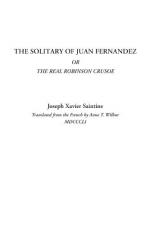On his right, where the land declines, he sees little valleys linked together with charming undulations; but on the mountains at his left, in the valleys at his right, among the hills in the distance, his eye vainly seeks the vestige of a human habitation.
He sets out in search of one. The boat from which he landed has deposited on the shore his effects—his arms, his nautical instruments, his charts, a Bible, and provisions of various kinds. Notwithstanding his piratical sentiments, the captain of the Swordfish has not designed to precede exile by confiscation. Selkirk takes his gun, his gourd; but, unable to carry all his riches, he conceals them behind a stony thicket, well defended by the darts of the cactus, and the sword-like leaves of the aloe, not caring to have the first comer seize them as his booty.
As he is occupied with this duty, he feels himself suddenly clasped by two long hairy arms; he turns his head, it is Marimonda, the captain’s monkey, a female of the largest species.
How came she there? Selkirk does not know.
Disgusted with her sea-voyages, with the intelligence natural to her race, Marimonda has undoubtedly profited by the moment of the boat’s leaving the ship to conceal herself in it and gain the shore along with the prisoner, which she might easily have done, unseen by all, during the transporting of the effects and provisions.
However this may be, Selkirk begins by freeing himself from her grasp, repulses the monkey and sets out: but the latter perseveres in following, and after having, by her most graceful grimaces, sought to conciliate him, marches beside him. Not caring to arrive at Coquimbo escorted by such a companion, which would give him in a city the appearance of a mountebank and showman of monkeys, Selkirk, this time, repulses her rudely, not with his hand, but with the butt of his gun.
Struck in the breast by this home thrust, the poor monkey stops, rolls up her eyes, moves her lips, and growling confusedly her complaints and reproaches, crouches beneath a tuft of the sapota, leaving the man to pursue his way alone.
Selkirk has at first directed his steps toward the valleys; after having traversed these, he arrives at the margin of a sandy plain, and as far as the eye can reach, perceives neither city, village, house, tent nor hut, nothing which can indicate the presence of inhabitants.
Nevertheless, a little grove which he has just traversed, seems to have recently, in its principal path, passed under the shears of a gardener; the foliage presents a certain symmetry; fragments of branches are strewed, on the ground, which seem to have been freshly cut; he even thinks he sees vestiges of the passage of a flock. On the lawn of the shore, he has seen, and still sees around him, trees with tufted heads, which must owe this form to art. He continues his researches.
At last, in the distance, beneath a fog which is just beginning to dissolve, he perceives a vast mass of white and red houses, some with terraced roofs, others covered with thatch; through the humid veil which envelopes them, he sees the glistening of the glass in the windows; already he hears at his feet the confused noise of cities; murmuring voices reply; the measured sound of hammers and of mills even reaches his ear.




